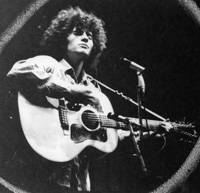

Davis published parts of this interview in the Los Angeles Free Press, May 9-15, 1975, and in Goldmine, May 10, 1985.
Eberle, Paul. "Tim Buckley Raps," Jazz & Pop, March, 1969.
Henderson, Bill. "Tim Buckley Talk-In," Sounds, August 3, 1974.
Hynde, Chrissie. "How a Hippie Hero Became a Sultry Sex Object," New Musical Express, June 8, 1974.
KUMN—FM, Albuquerque, NM, used by permission.
McKaie (first name not on copy; probably Andy). Rock, September 20-25, 1972.
Micklo, Anne Marie. "Tim Buckley Interview," Changes, p.29, Vol. I, No.7, 1969.
Mieses, Stanley. "Singer Tim Buckley Sends His 'Greetings From L.A.'," Leisure, August 19, 1973.
Nemko, Frankie, from my transcription of Frankie Nemko's unpublished taped interview with Tim Buckley, May/June 1975 (Tim's last interview), used by permission.
New Star Horizon, [November?] 1970-71.
(Fear and Loathing in Tulsa—Impressions of America © Lee Underwood, 2002. This work or any part of it may not be quoted (except for brief passages in a review) or used in any fashion or by any means or on any other web site without written permission from Lee Underwood.)